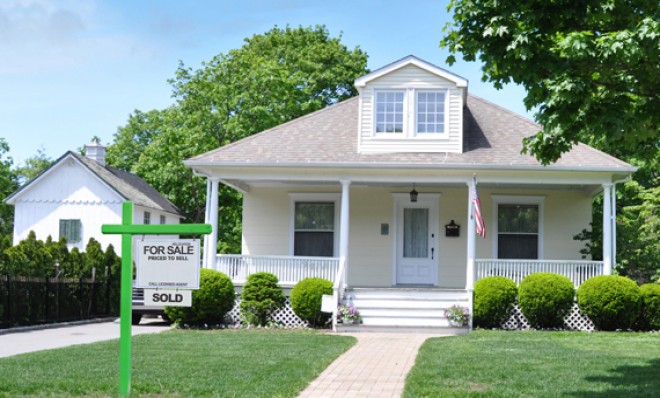House hunting: How much can you afford?
Crunch these numbers before you buy

A free daily email with the biggest news stories of the day – and the best features from TheWeek.com
You are now subscribed
Your newsletter sign-up was successful

In 2008, MaKenna Grae* and her husband prequalified for a $2 million mortgage. The couple was stunned. They had never expected to buy a home with a seven-figure price tag.
So, rather than heed the bank's advice, the Graes sat down and figured out how much they could comfortably pay every month. Before they looked at their first house, they had settled on a budget that had nothing to do with the bank's recommendation. Instead of shopping for $2 million sprawling mansions, the couple set out to find a home for about $500,000 in northern New Jersey.
"I cannot imagine what our stress level would be or how crazy our lives would be if we had listened to the banks about what we were approved for and bought a $2 million home," says Grae, who ultimately bought a four-bedroom house for about $425,000 in Elmwood Park, New Jersey.
The Week
Escape your echo chamber. Get the facts behind the news, plus analysis from multiple perspectives.

Sign up for The Week's Free Newsletters
From our morning news briefing to a weekly Good News Newsletter, get the best of The Week delivered directly to your inbox.
From our morning news briefing to a weekly Good News Newsletter, get the best of The Week delivered directly to your inbox.
A real estate rule of thumb
When the housing bubble burst and it became clear that lenders were handing out mortgages with their eyes closed, many banks tightened their lending practices. Buyers suddenly were being asked to show stellar credit ratings and lay out 20 percent of the price of the home as a down payment. But, five years later, as the housing market heats back up again, some banks are loosening the reins and once again offering buyers sweeter deals. For buyers who were shut out of the mortgage business for the past five years, the ability to buy is suddenly real again. But just because a bank thinks you can afford a multimillion-dollar house doesn't mean it's a wise financial choice.
"Remember, the bank is in the business of making loans, and they want you to borrow as much as they are comfortable risking on you — and not a penny less," says Ellen Derrick, a certified financial planner with LearnVest Planning Services.
So how much house should I buy?
A free daily email with the biggest news stories of the day – and the best features from TheWeek.com
Deciding how much to spend on a house isn't always so easy. The monthly payments on a $500,000 house vary considerably depending on the interest rate, your credit score, property taxes, and how much you need to put down. So, before you start scouring the listings, take a cold hard look at your finances and decide how much you can realistically pay.
The general rule of thumb: Mortgage payments should not exceed 28 percent of your monthly take-home pay, says Derrick. So, if you take home $9,000 a month, your mortgage payments should be no more than $2,520. Another way to look at it: The house shouldn't cost more than two and a half times your annual salary. So, someone earning $100,000 a year should be looking at houses that cost no more than $250,000. You should also have enough money set aside in a rainy-day fund to cover six months of household expenses so you can keep making those payments.
There are certainly upsides to buying a house that is well within your budget: It leaves money left over for other purchases. "It's not too much house, but enough for us. And best of all, the mortgage is affordable," says Grae of their home with an open floor plan, spacious kitchen and a pool. "We have enough cash flow that when we need to purchase something, like, say, a minivan, we were able to get the top-of-the-line model and pay cash for it.
With interest rates creeping up and housing prices skyrocketing in some markets, many buyers, fearing they've missed the bottom of the market, are eager to buy a home now. Buyers are putting down less cash, making it easier in the short term to buy a more expensive home. The average down payment on homes with a 30-year fixed-rate mortgage dropped to 16.1 percent in May, down from 17.6 percent in 2011, according to a LendingTree report.
"When I hear people say, 'Yeah, I know I'd have a hard time making the payment, but I just feel like I need to buy something while rates are low,' I just cringe," says Derrick. "Just because interest rates are low does not mean you should buy a house."
*Names have been changed to protect the home buyers.
More from LearnVest...
-
 What to know before filing your own taxes for the first time
What to know before filing your own taxes for the first timethe explainer Tackle this financial milestone with confidence
-
 The biggest box office flops of the 21st century
The biggest box office flops of the 21st centuryin depth Unnecessary remakes and turgid, expensive CGI-fests highlight this list of these most notorious box-office losers
-
 The 10 most infamous abductions in modern history
The 10 most infamous abductions in modern historyin depth The taking of Savannah Guthrie’s mother, Nancy, is the latest in a long string of high-profile kidnappings